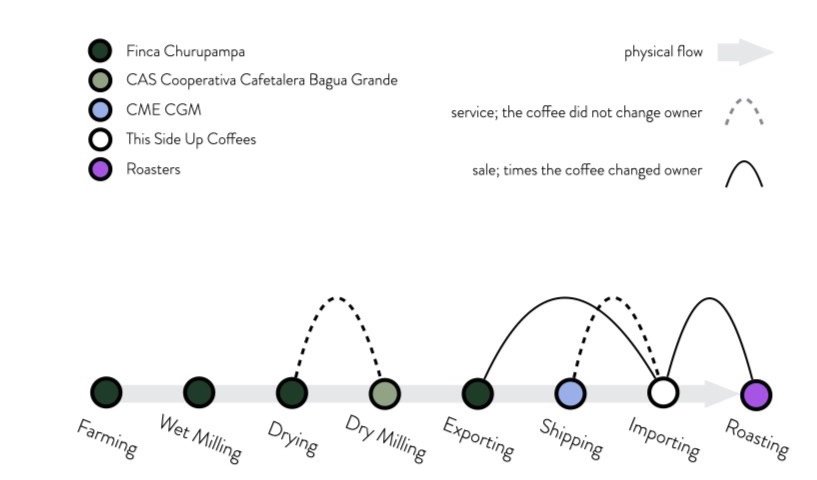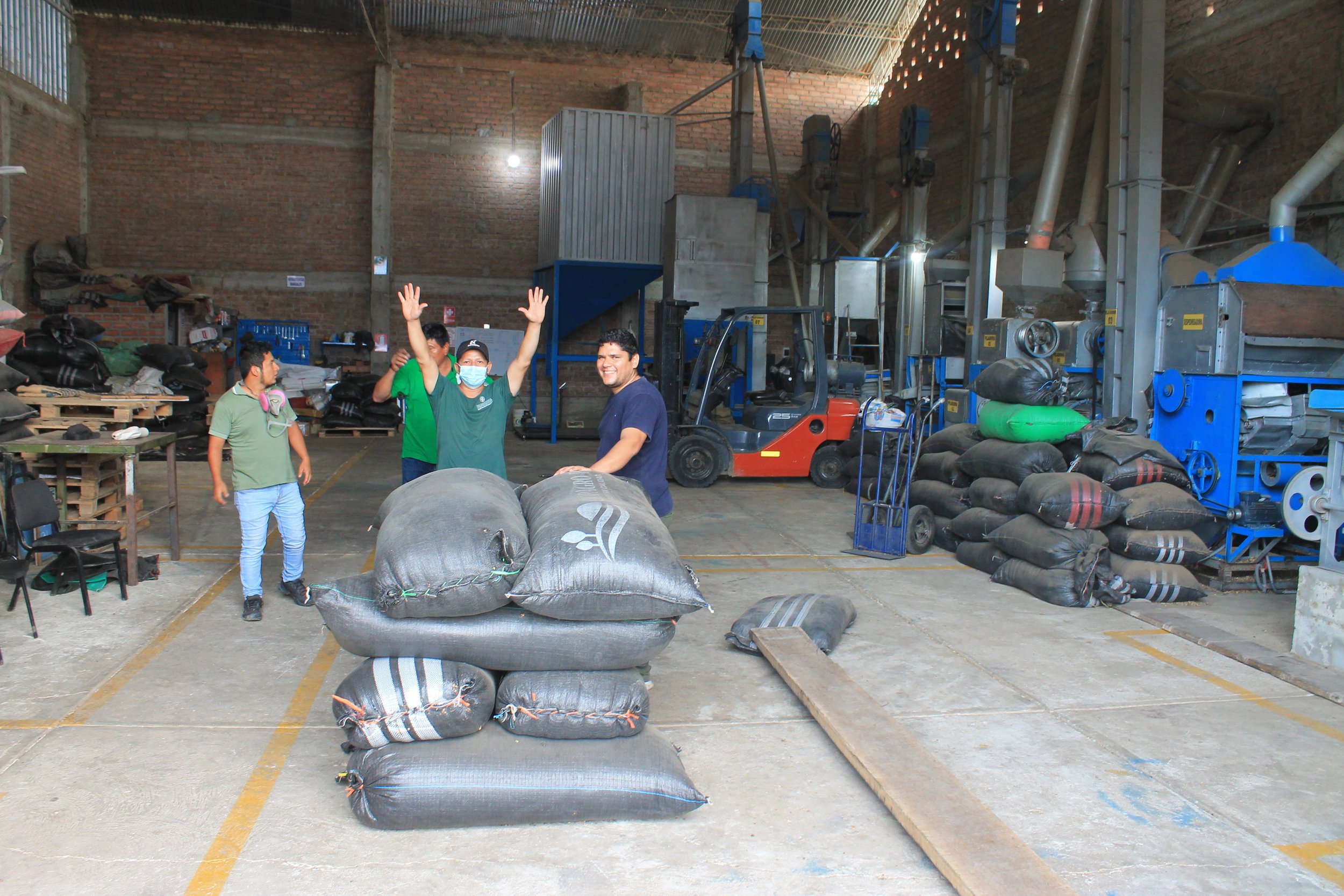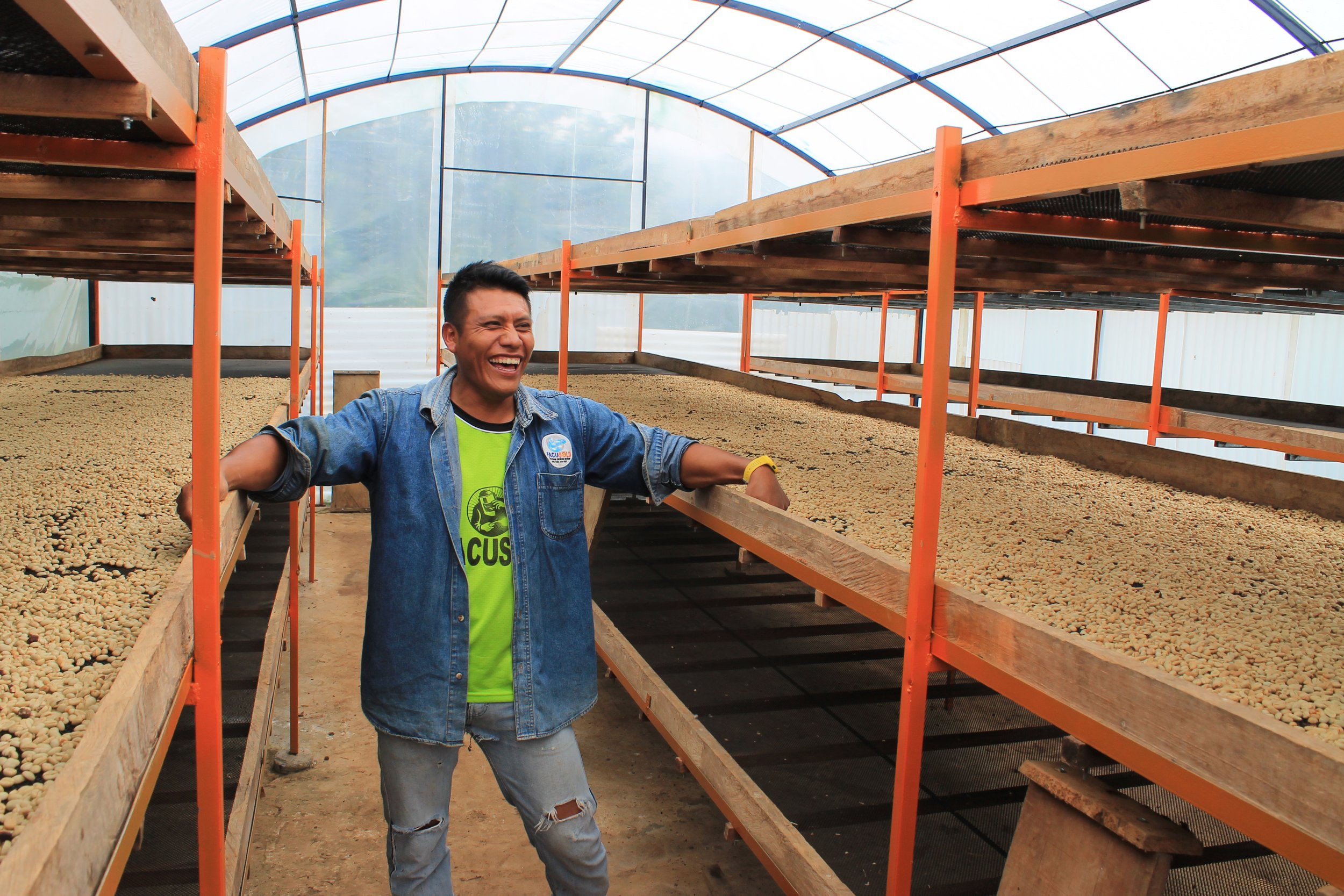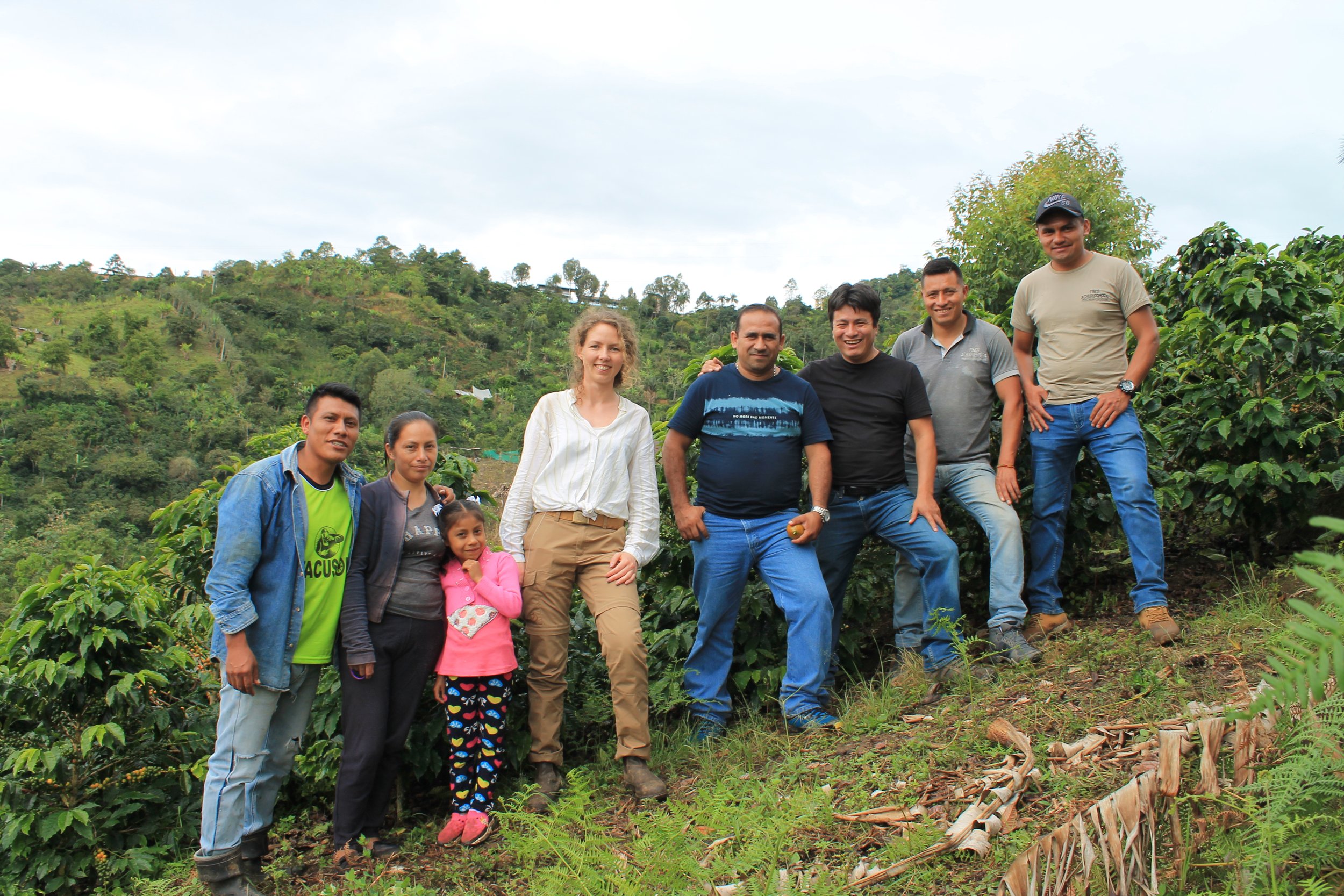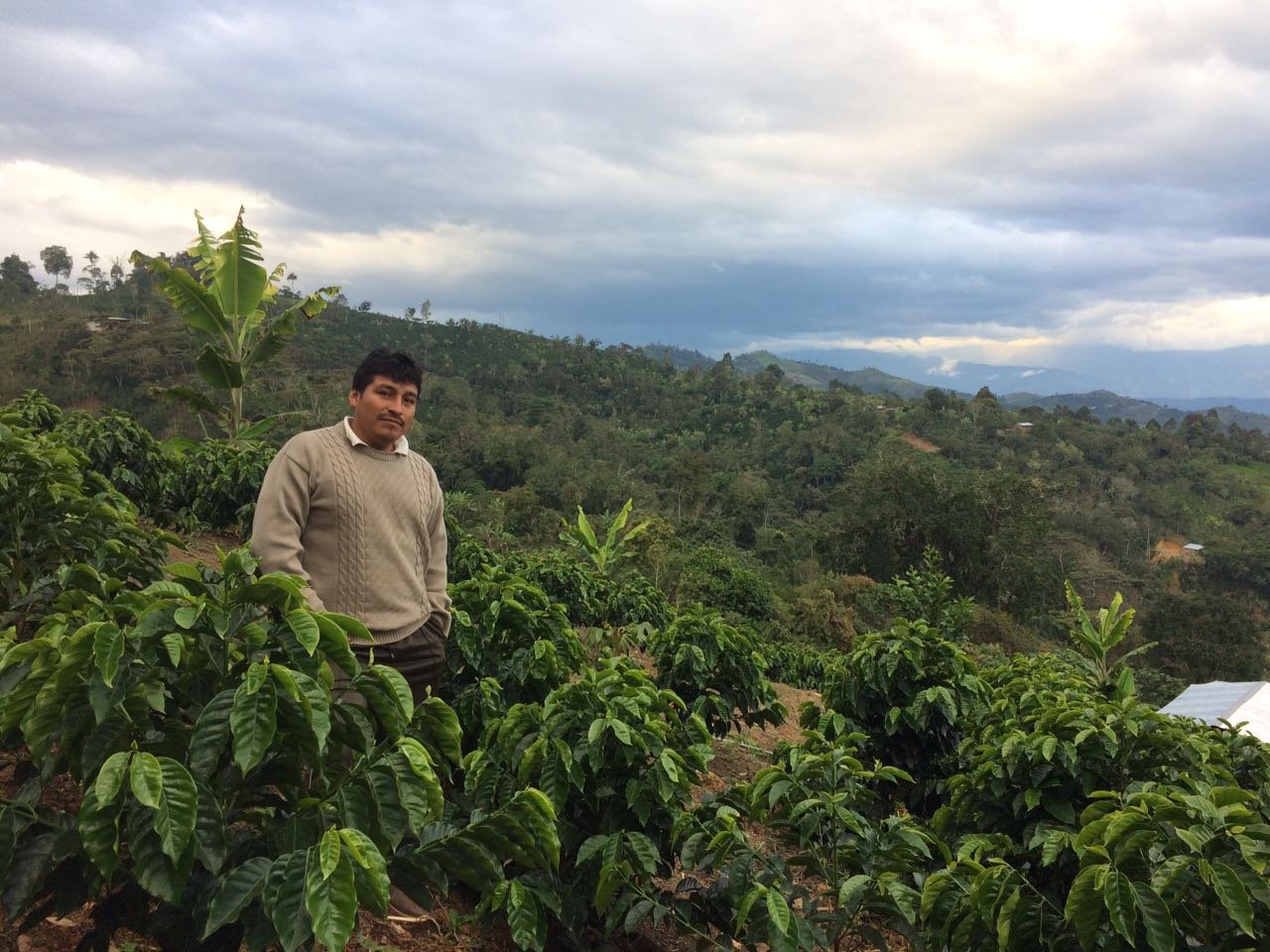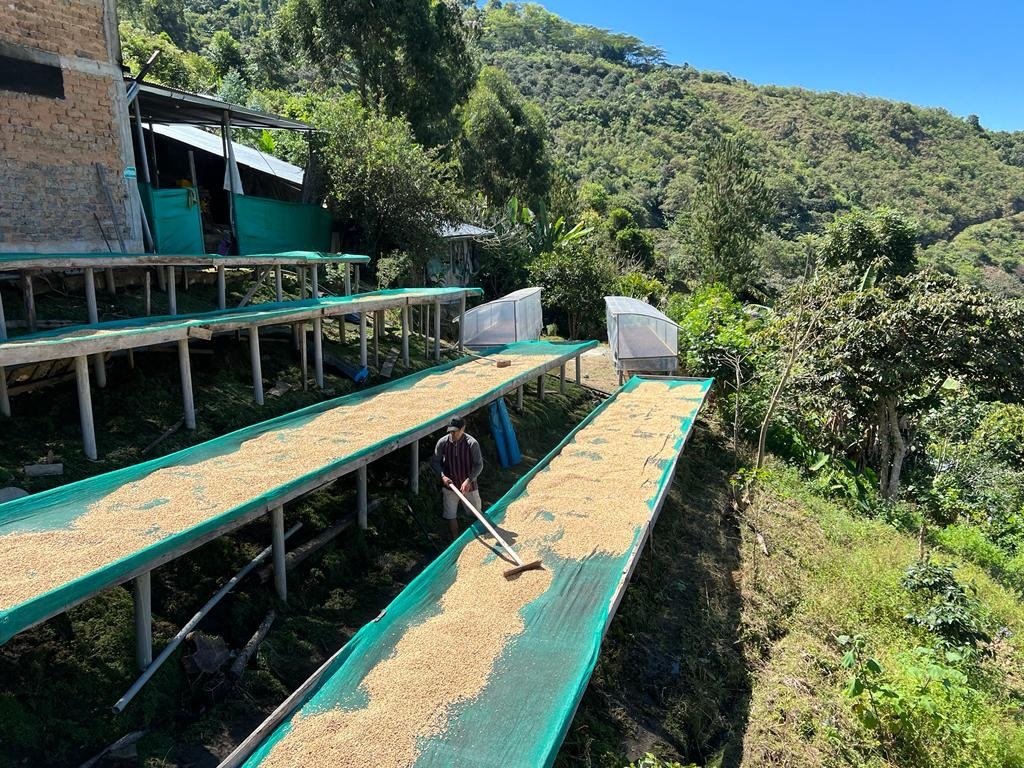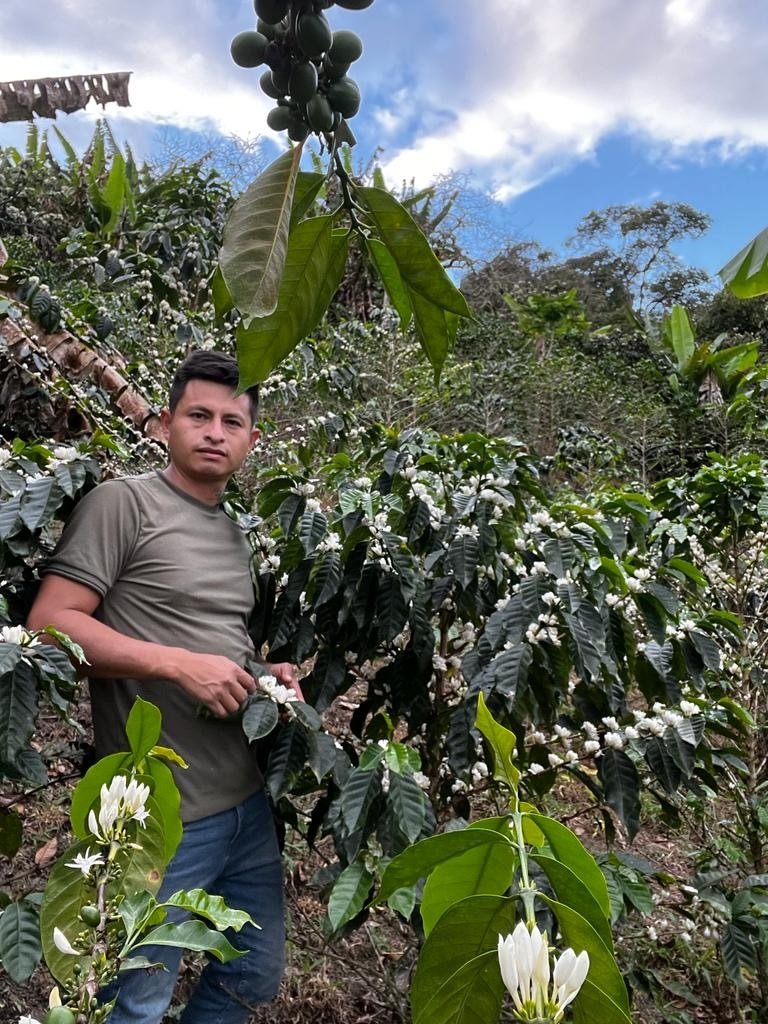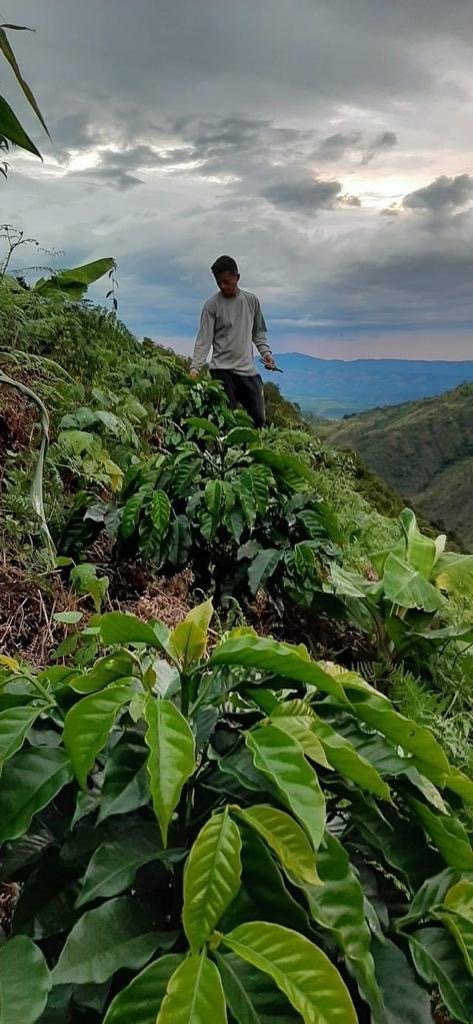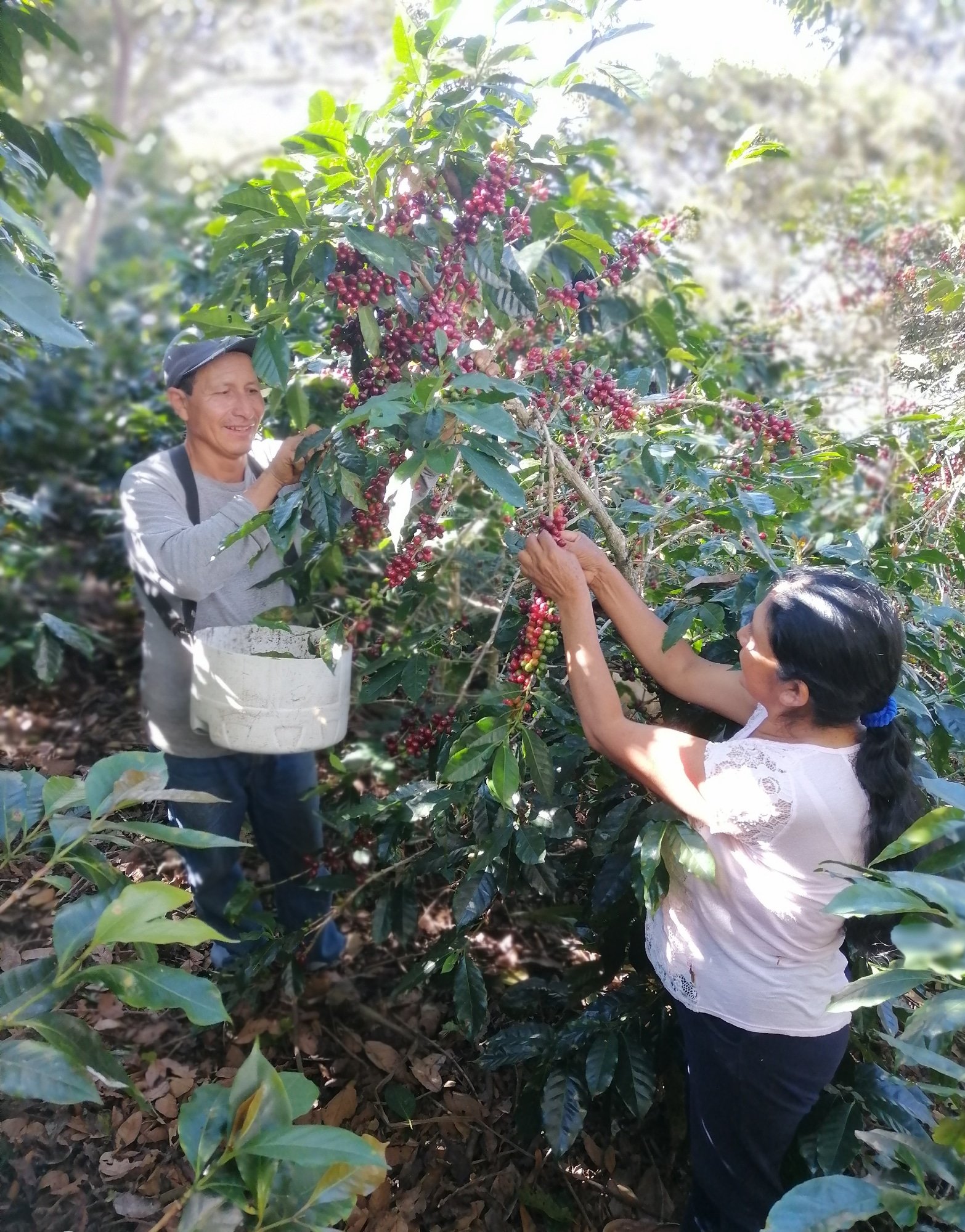THE CIRCULAR AGRICULTURE ENTERPRISE
“Yes, growth can happen by coming together as a family.”
Eber Tocto
When Eber Toco returned to Churupampa after learning about coffee in other regions, he already had a clear vision of his goal. One day, he would make the Chrupampa region an exemplary model of agroecology and circular agronomy. One day, farmers would stop seeking better opportunities in the city or the coast. He would create self-sufficient estates and promote sustainable agronomic practices.
As a boy, Eber and his family lived in a 3 by 3 house, with two beds for 4 brothers and an outside kitchen made of sticks. In most seasons, his father would come out in debt, and to pay this debt, he would travel to the city during the off-season. So, when Eber returned home with new and experimental ideas, his father wondered how something like this could work?
Most of his brothers were scattered throughout the country then, some on the coast, some in the city, working low-paying jobs and long hours. One by one, Eber called them and asked them to return. His father, however, took a lot of convincing. Eventually, he agreed to start a pilot project with his sons, so for this first season, they sold 40 bags. Thanks to their acute business mentality, they always reinvested their money and grew exponentially.
Today, the Tocto family's achievement is a national example of how entrepreneurship, respect for local farming traditions, circular thinking, and direct roaster relations can completely change rural livelihoods. Since 2011, the coffee farming community in Chirinos has done away with the subsistence coffee farming mentality and steadily created a strong, quality-focused brand: their innovative processing and independent quality control lab ensure that they can make beautiful coffees that are sought-after yearly by the specialty market - up to now mainly in the US.
Meet the farmers of our 2022-2023 import from Churupampa.
Finca Churupampa exports about 110 coffee containers yearly and works with 280 producers from Chirinos.
cordillera andinA
neftali santos
seasonal workers: 6
trees: 23,000
hectares: 10 (only 6 for coffee)
bags bought: 40
THIS SIDE UP VALUE CHAIN:
THE PRICE YOU PAY: €9,04
CULTIVARS:
Typica, Caturra and Pache
ALTITUDE:
1,600 - 1,900 metres above sea level.
NOTABLE:
Churupampa is not just a farm, it's a social business model which the Tocto family continuously expands, not only in Chirinos, but in nearby areas, such as Pariamarca. They continuously upgrade their techniques and facilities, while offering technical and processing assistance to the farmers members. They also expand their plant renovation schemes, with organic fertilisation and composting methods. Their coffee is organic and Fair Trade Certified.
KEY ACHIEVEMENTS:
2017: farmers who produced our two lots installed a small drying station (structure + raised beds) on their farm to dry their parchment and extend the drying from 6/7 days on the patio to about 25 days of slow drying, which considerably extends the shelf life of the coffee.
2018: exchanged knowledge of Churupampa’s superbly circular coffee system into the TSU network at the Producer Crossover in Amsterdam in June.
2019: imported the first 83+ coffee from Churupampa - but retaining a relatively similar premium, an experiment to appeal to roasters on a budget.
2020: through our partnership with the Tocto family, farmers from Churupampa can better understand their margins and re-invert into their estates. Many other farmers confirm the desired quality in their lots and micro-lots, making the previous years' efforts tangible. Thanks to circular agriculture practices, many producers were prepared for the pandemic. We significantly increased our Churupampa supply this year.
2021: thanks to the positive response from the European market, Churupampa continues to expand its circular agronomy practices. Their training scheme takes a new direction: they now work with entire technified plots from zero, adding 50 new plots every year, from the 280 families they work with, every year.
2022: an unpredictable challenge arises when we face quality issues on the entire shipment. After openly discussing this unfortunate mistake with our partner, Lenin flew to our Regenerative Crossover event in Milan during the summer, where he openly explained the quality control challenges in the factory. Several conversations occurred between Lenin and a few affected roasters in this gathering. Throughout this experience, Churupampa perfected its quality control standards: a bigger warehouse was built to have enough space to store and prevent unwanted mixtures from happening, and, what's more important: the coffee is now being processed in another mill: Café Selva Norte, located in Jaén. According to Eber Tocto, this processing plant is one of the best in the region. Besides this, an industrial engineer was hired to verify quality standards.
PROCESSING:
Fully washed and double fermented - using a hand pulper, coffees are pulped and fermented in tiled tanks for about 12-24 hrs depending on weather. They are then washed and fermented again for the same amount of time. Coffees are then washed again and graded in channels. Parchment is dried on raised beds covered in plastic. This drying technique is absolutely vital to counter the heavy rainfall and high humidity that characterises harvest months in Chirinos
CHURUPAMPA FARMERS 83+ Basic BLEND: €5,66
This is the total price Churupampa pays farmers in two rounds. This includes an extra premium that we decided to pay so Churupampa can expand its already impressive sustainability program. The prices paid for other coffees are:
La Lima Microlot: €8,59 *
Cordillera Andina Microlot: €8,59 *
Churupampa: €0,85
Churupampa export, packing, quarantine, local tax and handling expenses + insurance.
SHIPPING: €0,41
Total shipping costs from Paita to Rotterdam + local clearance and warehousing.
THIS SIDE UP: €1,40
This Side Up compensation for spending time and resources importing this coffee, according to our most expensive Trade Model. Our work includes year-round contact with producers, managing export, shipping, import, warehousing, grading, sampling, finding and keeping roasting partners for all the coffees. For a full overview of what we do to earn our margin, see the Trade Models page.
FINANCING: €0,52
Average financing cost (5% of the sales price) we have to pay lenders - simply because we don’t have the money in the bank to buy such large amounts of coffee all at once. This ensures immediate payment to Churupampa when the coffee leaves the port.
REGENERATION: €0,06
A standard TSU premium on all coffees designated exclusively to accelerate farmers’ own regenerative agriculture projects. This margin will go to support Finca Churupampa work on soil recovery through the use of solid and liquid biofertilizers made with organic waste and microorganisms.
*These numbers are a first version based on figures provided by our local partners. More details to be added later.
AVAILABLE FROM Churupampa:
La Lima microlot - fully washed
Cordillera Andina microlot - fully washed
83+ Basic Blend - fully washed
CONTACT Churupampa
Lenin Tocto Minga is the manager of Finca Churupampa, shoot him an email to find out more about their coffee and impressive sustainability measures. Our communication is solely in Spanish.
CONTACT Lenin Tocto Minga
EMAIL gerencia@fincachurupampa.com
TEL +51 949 605 978
Chirinos, San Ignácio - Cajamarca, Perú
Photo Gallery:
You may use these images freely to promote Finca Churupampa.
ABOUT CHURUPAMPA
Known for the Andes mountain range, and for its incredible number of microclimates (28!), Peru is probably one of the best suited countries in the Americas to grow specialty coffee. Coffee was introduced as early as in the 1700s, but only at the beginning of the last century the country started to play a prominent role in global coffee exports. This surge in export was consequent to a large loan repayment scheme which handed Britain over 2 million hectares of land that was quickly converted into British owned coffee plantations.
Fast forward to more recent times, the old coffee plantations have been divided and re-distributed among the local population, giving rise to a small, fragmented and yet vibrant coffee sector. For decades, the country focused on strengthening the sector and organising farmers in smallholder coffee cooperatives to increase production, with a major focus in fair trade and organic production. This effort led Peru to rise the ranks of leading export countries – and leader in organic production. However, it also posed limits to creating the adequate infrastructure to produce high end specialty coffees. In the 2000s, while neighbouring countries started to pay attention to the specialty coffee market in search of premium and added value, Peru struggled to strike its own balance between ‘volume’ and ‘quality’.
Luckily, this is no longer the case today. More producer groups are investing in quality. The Tocto family took it upon themselves to radically change the way they were growing coffee by establishing a new coffee farming model based on principles of sustainability and quality. Their farm, Finca Churupampa (a Quechua word, ch’uru means "snail" and pampa means "plains") quickly became a shiny example of how to integrate agronomic best practices, focused on healthy plants and soil nutrition, and enhancing quality, focused on planting the right varieties and investing in proper processing and drying infrastructure. Quality control is also not new to them. Eber – one of the founders of Finca Churupampa – was one of the first Peruvian cuppers to become Q certified over ten years ago. Lot separation and quality evaluation is routine work at Finca Churupampa.
Our first two lots from the Churupampa farm landed in February 2018. We are extremely happy with how these two lots are cupping: the two of them together represent the true best of what we feel Peru has to offer: bright, clean (clearly very well processed) dark chocolate notes, full, creamy body, sweet and blackberry acidity. In February, Sara went to Peru again and met with the two main producers of both lots. They are both planning to invest in composting and microorganisms this year, and our premium will help towards that.
Between 2018 and 2019, we doubled our order from Churupampa and added a basic organic blend that is aimed at the same segment as our Brazil Capricornio Signatures and Nicaragua SHG blends. We’re happy to say that roasters in Europe are starting to value the deep chocolate notes of Peruvian coffees as the basis of a blend in the same way the US has for years. At the same time, the La Lima lot has gained more following because it has the above qualities combined with a fruit kick that makes it very suitable for an elegant filter coffee.
In recent years, our partners experimented several challenges, high conventional coffee prices made it difficult for them to stabilise, however as Walter Corrales says “ prices were up this year, but it’s one year out of 60 that something like this happens, my question is: what are we doing in the long run?”. Besides this we faced an unprecedented challenge when we discovered an entire batch of coffee from our partners had quality issues and took this opportunity to carefully analyse their quality standards. After long conversations and discussions between Lenin, us, and also some affected roasters, the matter partly clarified. It's also great to know that this issue helped them improve their quality processing, change factories, and hire an industrial engineer.




